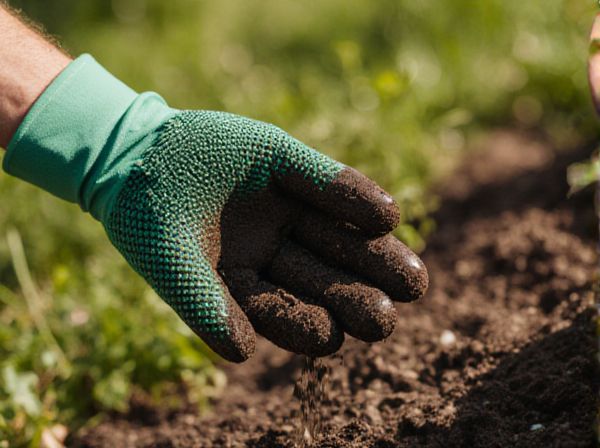
DIY compost vs Commercial compost Illustration
DIY compost offers the advantage of cost savings and control over ingredients, allowing for customized nutrient profiles ideal for specific plants. Commercial compost provides a consistently balanced and sterile product, reducing risk of contaminants and accelerating soil enrichment. Choosing between them depends on budget, time commitment, and desired nutrient precision for gardening needs.
Table of Comparison
| Feature | DIY Compost | Commercial Compost |
|---|---|---|
| Cost | Low to Free (using kitchen scraps, yard waste) | Moderate to High (purchase price varies by brand and quality) |
| Composition | Variable, depends on materials added (organic waste) | Consistent mix, often enriched with nutrients and additives |
| Processing Time | 2 to 6 months, depending on conditions | Ready to use immediately or within weeks |
| Control Over Content | Full control, choice of ingredients | Limited, pre-packaged formulas |
| Quality & Nutrient Content | Variable; depends on raw materials and composting method | Consistent and tested for nutrient levels (N-P-K ratios) |
| Convenience | Requires effort and space for composting setup | Ready to use; no setup required |
| Environmental Impact | Reduces waste, promotes sustainability | May involve packaging and transportation emissions |
Understanding DIY Compost: Benefits and Drawbacks
DIY compost offers the advantage of using household organic waste, reducing landfill contributions and cutting costs on commercial products. It allows customization of input materials, promoting nutrient-rich soil tailored to specific garden needs, but requires time, effort, and knowledge to manage factors like aeration and moisture. Commercial compost provides consistent quality and pathogen-free assurance but often comes at a higher price and may contain less diverse microbial communities compared to well-maintained DIY compost.
What Sets Commercial Compost Apart
Commercial compost undergoes rigorous quality control and sanitization processes, ensuring a pathogen-free and nutrient-rich product ideal for gardening and agriculture. Unlike DIY compost, commercial compost often includes a balanced blend of organic materials and additives that accelerate decomposition and enhance soil fertility. Its consistent texture and nutrient profile make it a reliable choice for large-scale landscaping and farming applications.
Cost Comparison: DIY vs. Commercial Compost
DIY compost significantly reduces expenses by using household scraps and garden waste, often requiring minimal investment in bins or tools, making it a cost-effective choice for sustainable waste management. Commercial compost typically involves purchasing pre-packaged products, which can range from $20 to $50 per cubic foot, adding substantial recurring costs compared to the virtually free nature of DIY composting. Over time, DIY compost not only saves money but also promotes environmental benefits by reducing landfill waste and producing nutrient-rich soil amendments at no extra cost.
Environmental Impact of DIY and Commercial Compost
DIY compost reduces landfill waste and greenhouse gas emissions by recycling organic kitchen and garden scraps on-site, minimizing transportation and packaging carbon footprints. Commercial compost often involves industrial-scale operations that can optimize nutrient content but may include significant fossil fuel consumption for collection, processing, and distribution. Both methods support soil health and carbon sequestration, yet DIY composting offers a lower environmental impact through localized, waste-to-resource conversion.
Nutrient Content: DIY Compost vs. Commercial Alternatives
DIY compost typically contains a higher diversity of nutrients such as nitrogen, phosphorus, and potassium, deriving from varied organic waste like kitchen scraps and garden clippings. Commercial composts often undergo standardized processing, resulting in consistent nutrient profiles but potentially lower microbial diversity compared to homemade options. Home-produced compost enriches soil biology and fertility more effectively due to its complex organic matter composition, enhancing plant growth and soil health.
Time and Effort: Making Your Own vs. Buying Ready-Made
DIY compost requires a significant time investment, often taking several months to fully decompose organic materials, alongside regular turning and monitoring of moisture levels to ensure optimal results. Commercial compost offers the advantage of immediate usability, having already undergone controlled processing to achieve a stable, nutrient-rich product. Home composting demands consistent effort and active management, while ready-made compost provides convenience and time savings for gardeners.
Customization: Tailoring Compost for Your Garden
DIY compost allows gardeners to customize nutrient content and texture by selecting specific organic materials, such as kitchen scraps, yard waste, and manure, to meet the unique needs of their soil and plants. Commercial compost typically offers standardized nutrient profiles and may contain additives or fillers that do not align with all garden types. Tailoring compost through DIY methods enhances soil health and plant growth by optimizing compost composition for specific garden ecosystems.
Common Challenges in Home Composting
DIY composting often faces common challenges such as balancing green and brown materials, controlling moisture levels, and managing odor issues effectively. Home composters may struggle with slow decomposition rates due to insufficient aeration or irregular turning of the pile. In contrast, commercial compost products provide a consistent nutrient profile and typically avoid these issues, offering a more convenient and reliable solution for soil enrichment.
Quality and Consistency: Which Option Delivers Better Results?
DIY compost quality varies based on ingredient selection and decomposition control, often leading to inconsistent nutrient content and maturity levels. Commercial compost undergoes standardized processes, ensuring consistent quality, pathogen-free material, and balanced nutrient profiles. For reliable results, commercial compost typically delivers superior consistency and enhanced plant growth benefits compared to most homemade alternatives.
Making the Right Choice: Factors to Consider for Your Garden
DIY compost offers control over ingredient quality and nutrient balance, allowing gardeners to tailor the mix to their soil's specific needs. Commercial compost provides convenience and consistency, often enriched with additives that promote faster decomposition and pathogen suppression. Factors like budget, time commitment, nutrient requirements, and the intended use on plants determine the best choice for optimizing soil health and garden productivity.
DIY compost vs Commercial compost Infographic

 gardendif.com
gardendif.com